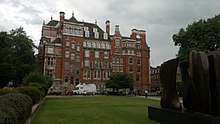Church Commissioners

The Church Commissioners is a body managing the historic property assets of the Church of England. It was set up in 1948 combining the assets of Queen Anne's Bounty, a fund dating from 1704 for the relief of poor clergy, and of the Ecclesiastical Commissioners formed in 1836.
The Church Building Act 1818 granted money and established the Church Building Commission to build churches in the cities of the Industrial Revolution. These churches became known variously as Commissioners' churches, Waterloo churches or Million Act churches. The Church Building Commission became the Ecclesiastical Commissioners in 1836.
An earlier Ecclesiastical Duties and Revenues Commission had been set up under the first brief administration of Sir Robert Peel in 1835 with a wide remit, “to consider the State of the Established Church in England and Wales, with reference to Ecclesiastical Duties and Revenues” (Minutes of the Commission, 9/2/1835); this body redistributed wealth between the dioceses and changed diocesan boundaries, and the permanent Ecclesiastical Commission was formed the following year.
The value of the Commissioners' assets was around £5.5 billion as at the end of 2012.[1] Most of the income is used to pay clergy pensions.
The Commissioners also oversee pastoral reorganisation, the consent of the Commissioners being required for establishing or dissolving team and group ministries, uniting, creating or dissolving benefices and parishes, and the closing of consecrated church buildings and graveyards.
The Church Commissioners are now based at Church House, Westminster, London, having long occupied No. 1 Millbank.[2] However, the Millbank building was sold in 2005 to the House of Lords for accommodation of members and staff; the Commissioners completed the move to Church House in 2007.[3] They used to be an exempt charity under English law.[4]
Current commissioners
- Justin Welby, Archbishop of Canterbury (Chair)[5]
- John Sentamu, Archbishop of York
- The three Church Estates Commissioners, who represent the Church Commissioners in General Synod – the Second Commissioner is a Member of Parliament and answers to Parliament for the business of the Commissioners
- First Church Estates Commissioner: Andreas Whittam Smith
- Second Church Estates Commissioner: Caroline Spelman MP
- Third Church Estates Commissioner: Andrew Mackie
- Four bishops elected by the House of Bishops
- Three elected by the House of Clergy
- Robert Baker
- Amanda Fairclough
- Stephen Trott
- Four elected by the House of Laity
- April Alexander
- Peter Bruinvels
- Sally Muggeridge
- Jacob Vince
- Two elected by the deans
- Jonathan Greener, Dean of Wakefield
- John Clarke, Dean of Wells
- Three nominated by the Queen
- Harry Hart
- Ian Watmore
- John Wythe
- Three nominated by the Archbishops of Canterbury and York
- Simon Picken QC
- Jeremy Clack
- Mark Woolley
- Three nominated by the Archbishops of Canterbury and York after consultation with the Lord Mayors of the Cities of London and York and the Vice-Chancellors of Oxford and Cambridge Universities
- vacant
- Hywel Rees-Jones
- vacancy
- Six ex officio members
- The Rt Hon David Cameron, Prime Minister
- The Rt Hon Chris Grayling, Lord President of the Council
- The Rt Hon Michael Gove, Lord Chancellor
- The Rt Hon John Whittingdale, Secretary of State for Culture, Media and Sport
- The Rt Hon John Bercow, Speaker of the House of Commons
- The Rt Hon The Baroness D'Souza, Lord Speaker
The Secretary (i.e. chief executive) of the Church Commissioners is Andrew Brown
See also
References
- ^ Asset Management | Church of England
- ^ Historic England. "Details from listed building database ({{{num}}})". National Heritage List for England. Retrieved 20 April 2015.
- ^ "Church Commissioners complete sale of Millbank site". www.churchofengland.org. The Church of England. 29 March 2005. Retrieved 17 August 2015.
- ^ https://www.gov.uk/government/publications/exempt-charities-cc23/exempt-charities
- ^ http://www.churchofengland.org/about-us/structure/churchcommissioners/organisation-and-governance/the-church-commissioners.aspx
External links
- The Church Commissioners
- Church Commissioners Measure 1947 at the UK Statute Law Database
- Church Commissioners Measure 1970 at the UK Statute Law Database
